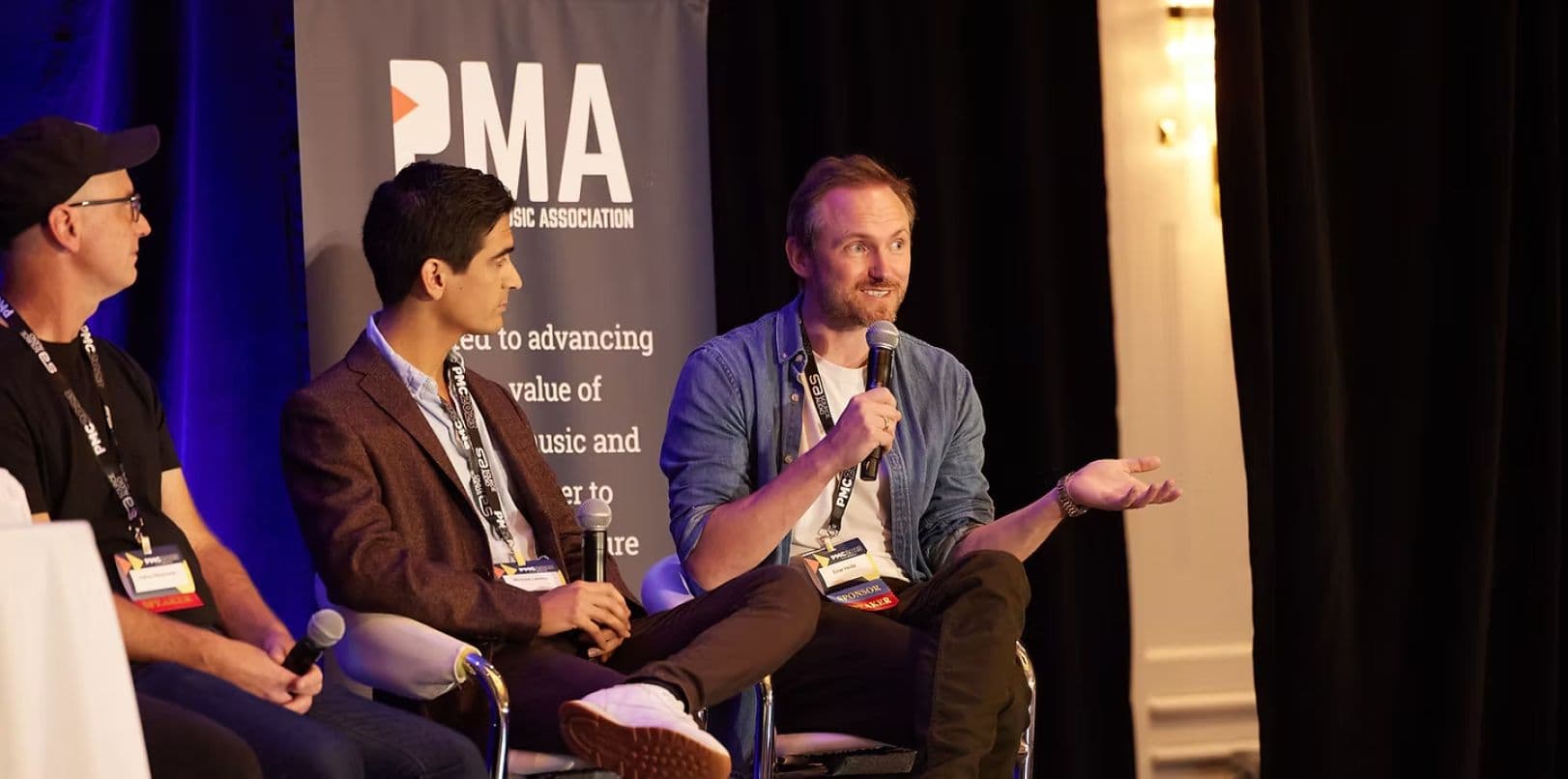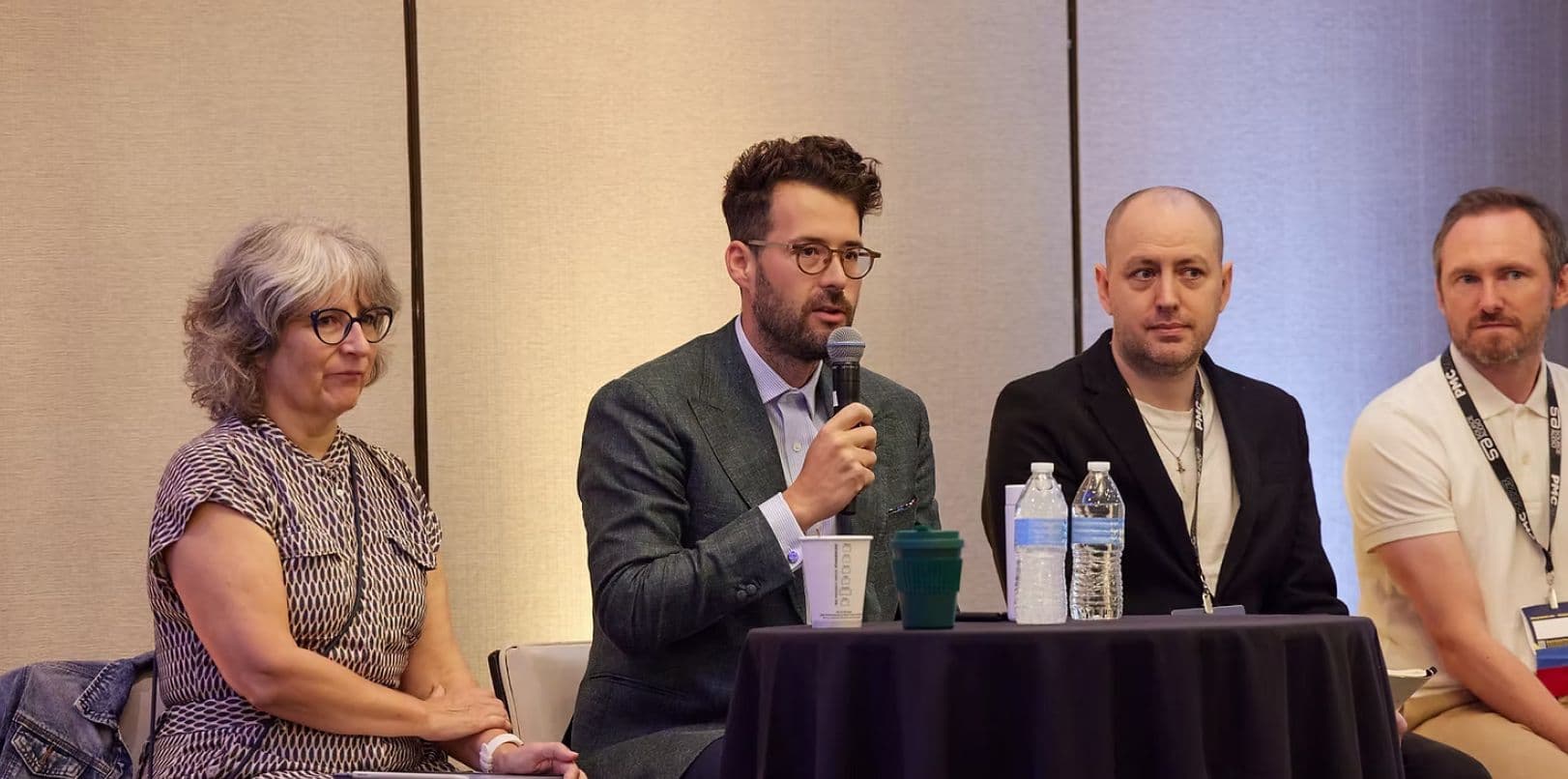- industry insights
Perspectives from PMC '23: The evolving landscape of production music

Change can feel like a threat until you bend it in your favor. Carefully but eagerly, the music industry is exploring ways to bend the inevitable: AI, hundreds of new libraries, and the power of a well-chosen niche. Plus, looks like we’re all putting collaboration over competition. Go, us.
That’s one way to summarize this year’s PMC (Production Music Conference), the biggest annual event of the Production Music Association that took place in early October.
For more details, we chatted with AIMS co-founders Martin Nedved and Einar Helde, music industry professionals bringing assistive AI to the space. While at PMC, they noticed several patterns among the discussed topics — from optimism that was a refreshing change of pace after the pandemic to a handful of doomsday scenarios (think bitter, jobless composers replaced by AI).
Is there a right way of looking at the future? Maybe not. But at the very least, it’s good to remember that progress rarely ends with an extreme; we’re more of an adaptive, “middle ground” species. Lost some jobs? Create new ones. That kind of thing.
With this in mind, here are some PMC insights about the increasing diversity of libraries, maintaining quality over quantity, and how some AI and music production come together to support creativity — rather than stifling it.

A bit confused but optimistic about the future
The production music community is cautiously positive. Despite the hazy path ahead, companies are in investment mode. They’re growing, capturing niches of the market, gaining new clients, and seeing greater revenue. As video booms — from streaming services to TV broadcasts (which remain the main source of income for production music) — so does the music that gives life to the visual.
Of course, everyone’s starkly aware of the ongoing concerns about AI, royalty-free models, and beyond. The best we can do is work with what we know for sure.
One certainty is that no matter how music is created, it will always need to be discovered. In other words: When anyone can create music, distribution becomes that much more important. And even the highest-quality catalog needs to actively get that music out there for people to hear.
Because companies know what deserves their attention, excitement overshadows fears. As Einar picked up from countless PMC conversations: “People are quite bullish about the future. They feel special enough, the quality of their music feels good enough, they’re confident in their unique selling points." Further proof of that confidence is the outpouring of new companies. And lots of them.
Lower barrier to entry doesn’t mean lower quality
The age of general-purpose catalogs is over. Here’s what’s happening these days: You’re a composer who’s been in the industry for decades. You know where your talents lie, whether it’s gaming, advertising, etc. You hop online, build a website, get a company like AIMS to tag your music and make it searchable, done. You’ve got yourself a library. It’s fast and not overly expensive. But that doesn’t make it easy.
Music professionals know what they’re looking for and recognize the good stuff. So if you choose a niche no one needs, or if you’re coming in with a lack of sufficient experience, your journey is cut short.
“You have to bring uncompromising quality. No one will give you a second chance.”
On the other hand, if you’re successful, your boutique catalog is acquired by a bigger player — which makes room for another newcomer to jump in and start fresh. It’s a healthy formula that works in all kinds of industries.
Einar explained: “People who are really good get acquired, leave for a few years, maybe come back with something new. This goes round and round, the industry becomes more professionalized, and the standards of what is and isn’t valuable are set.” As a result, the level of quality keeps growing.

Assistive AI gets you promoted, not fired
The industry is excited about assistive AI. Martin noted that everyone recognizes the benefits of AI tools like AIMS, especially since the struggles they address are all too familiar.
Because it’s not a direct replacement, assistive AI isn’t controversial. It has clear added value — just like countless digital tools simplifying manual work. Rather than creating tags, you can be managing what the tags should be in the first place. Instead of searching for the right track for half an hour, you can be spending that time thinking about less obvious, more creative musical choices.
Joining the PMC session called Leveraging AI for Production Music Catalogs, Einar spoke about AIMS capabilities like similarity search and tagging. There wasn’t much to debate. It works, it helps, period. But that session also included the topic of generative AI — and that’s a different story.
The generative AI elephant in the room
Clarity was a bit harder to come by with this one. Einar observed that the jury’s still out on the ultimate role of AI:
“From the composer's point of view, there were two camps... The ones that saw AI tools from the lens of, ‘Okay, I can produce more, better, faster,’ and the ones saying, ‘I'm gonna be replaced and lose all my money.’”
Lots of questions on the table, including just how much time and money companies can actually save by generating their own music. AI won’t ever get it right on the first try; you’ll have to explain in detail, sift through loads of results, and ultimately may not save minutes or cash. Plus, with licensing regulations being up in the air, safe music from trusted suppliers will still dominate the B2B business.
We won’t get into expansive topics like copyright issues here, but the general consensus is this: The industry will evolve, as will the demand, processes, and roles within it.
Redefining the role of a composer (again)
Composers today do something very different compared to 20 years ago. What once required expensive studios and musicians now comes down to a computer. And what they do on that computer in 20 years will be different from what they do today.
Does that mean we’ll need fewer composers? Will only the top experts remain since basic tasks will be handled by AI, and therefore by anyone? Similarly to what happened with photographers — will high-end composers have higher fees than before? All remains up for debate.
But let’s not forget that composers are in no way the only ones facing major changes. Martin believes that the industry will get dramatically more effective and streamlined across the board. A general shakeup.
“AI is going to be in all parts of the industry: production, distribution, search, discovery, licensing,” he said. “It's going to be in the entire workflow, the entire value chain. Even further, AI will be able to check the usage of your music, if you got paid. And what’s done by companies now will be done by individuals.”

Overall, greater competition has built stronger bonds
To end on a lighter note, both Martin and Einar observed that the industry has matured in the best ways. While this year’s PMC was bigger than ever, it felt like a tight-knit community based on knowledge-sharing and efforts to work together.
As Martin put it: “The competition is higher than it was five, ten years ago. Everyone feels it, yet you might be friends with them, go for a drink. And the competition is inspiring; you see someone producing great music, see that it’s achievable, so you do it yourself.”
Einar mirrored the sentiment.
“People see each other as partners. They're looking at how we can make things better for our industry, make the joint pie bigger, rather than taking from one another’s.”
We’re all hungry to learn new things. As long as we stay as open-minded as PMC proved we are on our best days, the creativity and quality of the music industry are in safe hands.
